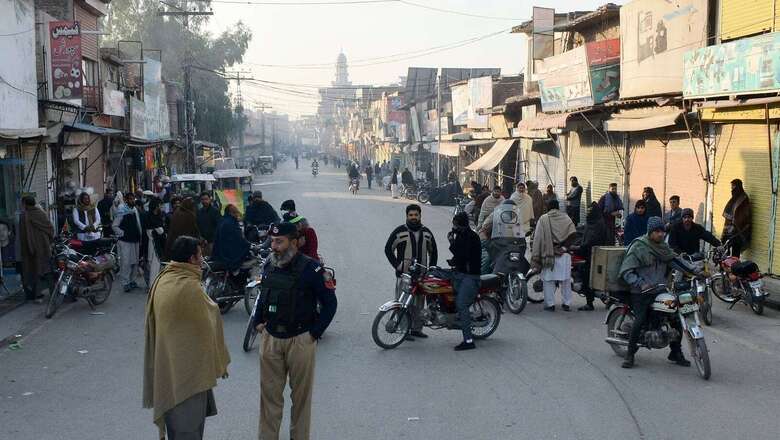
views
A terror shock is going to surprise Pakistan for decades it seems. For Pakistan’s army and its ruling establishment, the Tehreek-e-Taliban Pakistan (TTP) militant outfit was a chapter closed six years ago, in 2016.
2022: Not anymore. And they may be a bigger threat this time.
Pakistan’s ruling establishment was forced to convince the seemingly ‘dead’ militant group to come to a ceasefire agreement in May 2022 because of its rising scale of attacks across the country. They appealed to the Afghan Taliban, considered a senior brother and a parent to the TTP or Pakistan Taliban for it. Pakistan’s dwindling economic fortunes forced it to take this extreme step.
The TTP announced an end to the ceasefire agreement blaming Pakistan government and army of violating it consistently. The announcement came on November 28. Pakistan’s new army chief assumed office on November 29. The talks broke down in September 2022.
MAJOR SHOWDOWN LOOMING?
According to a report in the Pakistani publication Dawn, September saw a surge in militant attacks. Data from an Islamabad-based independent think tank, Pakistan Institute for Conflict and Security Studies (PICSS), says September saw 42 militant attacks, 35% more than August with 31 attacks. The attacks were at its peak in 2022. It was largely TTP-led, with 106% rise in the Fata and Khyber Pakhtunkhwa, where the TTP runs a parallel government. A total of 24 security forces personnel and 16 civilians were killed. In November, the outfit claimed it was behind 43 attacks that killed 113 security forces personnel. The attacks were spread across 18 districts of the country and were retaliatory or in defensive in nature as per TTP claims.
PICSS data shows a year-wise jump of 51.5%. Pakistan saw 165 militant attacks from August 2020 to August 14, 2021. It rose to 250 attacks the next year, from August 15, 2021 to August 14, 2022. Fatalities saw a jump of 47%, from 294 to 433.
Figures from the SATP, a data website on terrorism, show an increasing trend after a period of lull that the Pakistani ruling establishment saw as victory. The TTP, with its emergence in 2007, became the most lethal militant organization on the Pakistani soil. The country saw over 24,000 terrorist attacks between 2007 and 2016, the TTP end year, as claimed by the top leadership of the country.
Post the Taliban takeover of Afghanistan, 2021 saw 424 terror activities, which increased to 593 this year, till December 11, as per the SATP database. Since its establishment, the TTP has carried out around 550 major terror incidents in the country, killing over 1,700 civilians and over 1,000 security forces personnel. It includes the Peshawar school attack on December 16, 2014, killing 147 people, of whom at least 132 were students.
With the ceasefire over and with Afghanistan a friendly country to extend the presence, recruitment, financial support and training, the TTP is likely to emerge as a bigger threat this time. Afghanistan, after the Afghan Taliban takeover, has become a safe haven for the TTP militants. The TTP dominates the Pakistan-Afghan border area and its militants are active in South Waziristan, North Waziristan, Bannu, Lakki Marwat, Tank and Dera Ismail Khan.
A DIRECT THREAT
TTP’s current chief Noor Wali Mehsud spoke to CNN. He blamed Pakistan for breaking ceasefire and killing and arresting scores of TTP members. He ruled out getting any help from the Afghan Taliban. He also ruled out the use of Afghan soil. He asserted that the TTP’s war against the Pakistani government and army was ‘from within the territory of Pakistan’. He warned the ruling establishment of the country that the TTP was equipped, both financially as well militarily, to fight the Pakistan’s army for “decades". He called for an independent state in the tribal areas of Pakistan in an earlier CNN interview.
The SATP database says the overall strength of the TTP militants could be around 30,000 to 35,000 fighters. A December 2021 estimate by the Washington Post put their number around 10,000 fighters. While announcing an end to the ceasefire, TTP’s Mufti Muzahim, who oversees the defence operations of the militant outfit, said that the TTP fighters will now target the whole of Pakistan.
The TTP was formed as an umbrella group of 13 Taliban militant factions in December 2007. It hates democracy, Pakistan’s civilian government and its army. It wants to establish an Islamic Caliphate in the country and implement the Sharia law as imposed by the Afghan Taliban.
In the latest of the series of its increasing militant activities, the TTP militants on Sunday seized a Counter Terrorism Department (CTD) police station in Bannu district in Khyber Pakhtunkhwa. According to a report from Dawn, 25 TTP militants were arrested and being interrogated at the police station. They overpowered the interrogators. Now, the police offers are held at gunpoint, its viral video is out on social media and TTP militants are demanding a safe passage to Afghanistan.
Last month, the TTP militants killed six Pakistani police personnel in an ambush attack in Khyber Pakhtunkhwa. The militant outfit was also behind an IED attack on a Pakistani police vehicle in Swat, killing two police personnel and a former peace committee head, who was on the TTP hit list.
BURDEN ON AN ALREADY DERAILED COUNTRY
Pakistan is in big financial trouble. The external debt of $130 billion in 2021 (the World Bank) has literally made it a bankrupt nation surviving on commercial loans to repay its annual payments of dues with interests. Its forex reserve, at $6.7 billion, has fallen to its lowest in four years. It is pleading with the IMF, China and Saudi Arabia for further loans.
If the TTP substantially raises its scale of militant attacks in the days ahead, it add to the challenges of the country’s ruling establishment. It has to continue its anti-TTP operations in the areas considered to be the TTP’s stronghold as well as will divert significant resources and funds to counter the TTP’s unpredictable militant attacks across the country.
According to a report from Pakistan’s Interior Ministry, the country saw 434 militant attacks on the security forces in the first half of 2022, killing 323 security forces personnel. At 247, most of them were reported in Khyber Pakhtunkhwa.
The number of such attacks is expected to go up with the TTP’s fresh warning.
Read all the Latest India News here




















Comments
0 comment